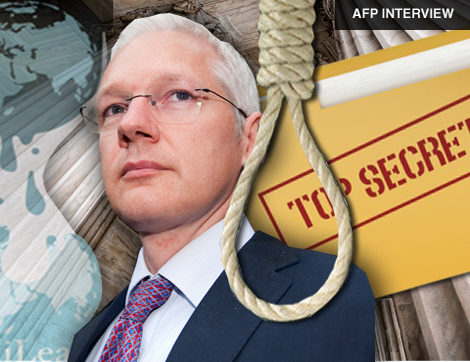
• Whistleblower Assange hides in Ecuadorian embassy in London
• Lawyer fears U.S. ready to indict Assange under Espionage Act
By Keith Johnson
Fearing persecution from a vindictive U.S. government, Wikileaks founder Julian Assange has taken refuge inside Ecuador’s embassy in London, where he now awaits a decision as to whether he will be granted political asylum, or be extradited to Sweden on sexual assault charges—a path that could eventually lead him to an American prison cell.
AMERICAN FREE PRESS has reached out to Assange, who is well known for being highly suspicious of news outlets. But in the meantime AFP did have a chance to speak with Michael Ratner, Assange’s U.S. lawyer.
Ratner tells this AFP reporter that there is “a high probability” that the United States is seeking to prosecute his client on espionage-related charges.
“I don’t think there’s any doubt about it,” said Ratner, “and if that’s not the case, I would ask the U.S. government to say unequivocally that they are not going to investigate, prosecute or seek to extradite Mr. Assange.”
If Assange falls into the hands of the U.S. government, Ratner believes he will be charged with violations of the Espionage Act of 1917, a statute Ratner says was developed to suppress free speech.
“It was [originally] used to put thousands of people, who were opposed to the first world war, into prison,” said Ratner. “In fact, a lot of the doctrine on the First Amendment came out of resistance to the Espionage Act. It was a statute that was deliberately used to go after [those with] unpopular opinions.”
In addition to being unjustly prosecuted for exposing government wrongdoing, Ratner fears Assange will likely suffer at the hands of U.S. authorities. “Look at what happened to Bradley Manning,” says Ratner. “He was in solitary [confinement], stripped and endured nine months of what UN members called ‘cruel and inhumane treatment.’ If that’s what happened to the man who allegedly uploaded the documents to Wikileaks, my guess is that Julian will be treated the same.”
Based on other cases his office has represented, Ratner believes Assange would not likely be allowed any outside communications while in U.S. custody, and that his lawyers would be subject to special administrative measures prohibiting them from discussing any information with the press.
“People whom [the U.S.] targets as dangerous or embarrassing to the state are essentially put into a 15th-century dungeon,” added Ratner.
U.S. Grand Jury Secretly Convened for Assange
By Keith Johnson
Earlier this year, hacked emails from Stratfor, a Texas-based private intelligence agency, indicated that a secret U.S. grand jury had produced an indictment against famed Wikileaks whistleblower Julian Assange. Although Assange’s U.S. lawyer Michael Ratner could not verify the validity of this claim, he went on to give a laundry list of evidence that suggests an indictment is—at the very least—in the works.
“There’s clearly been a grand jury sitting for several months in Alexandria, Virginia,” said Ratner. “At least one witness, David House, has come forward and shared notes on his testimony. Then we have the evidence that came out at the Bradley Manning trial, where an FBI agent admitted that there is an ongoing investigation of the ‘owners, founders and managers’ of Wikileaks. More recently, U.S. Justice Department spokesman Dean Boyd said the investigation of Wikileaks is continuing, while a grand jury out of the Eastern District has issued orders to [the social networking website] Twitter—asking for the identifying information and IP [Internet Protocol] addresses of various people and organizations—including Julian Assange and Wikileaks. Put that all together, and I think that we’ve got a pretty strong case that he’s a target.”
Ratner isn’t the only prominent attorney who believes Assange is getting a bum rap from a corrupt U.S. government. This AFP reporter spoke to Kevin Zeese, a member of the Bradley Manning Support Network and executive director of Voters for Peace.
When asked to respond to charges by U.S. officials and military leaders that Assange has “blood on his hands,” and has caused tremendous damage to national security, Zeese replied: “The real blood is on the hands of those who want secrecy. Secrecy kills people, while transparency saves lives.”
Zeese went on to say: “There’ve been multiple agencies, including the CIA, the FBI and the Department of Justice, that have done investigations regarding the national security impact of Wikileaks documents that were leaked by Bradley Manning. They found no serious damage.”
Regardless, Zeese believes truthseeker Assange has every reason to fear for his life at the hands of his accusers.
“After 30 years of going from the ‘war on drugs’ to ‘the war on terror,’ there has been a constant erosion of our justice system—where torturers aren’t prosecuted—but people who blow the whistle on war crimes are,” he said. “I can totally understand Julian’s fear of what would happen if he was brought to [the United States] on an indictment.”
While Zeese is hopeful that Assange will win his bid for political asylum in Ecuador, he remains skeptical about what awaits him outside the protective walls of the Ecuadorian embassy in London, where he has taken refuge.
“Can he get to [the mainland of South America]?” Zeese asked. “Will the vehicle he’s in be considered diplomatic and protected, or will the British arrest him when he leaves the embassy?”
Answers to those questions may come sooner than later, as Ecuadorian officials have recently stated that they will announce their decision after the London Olympics conclude on August 12.
——
Keith Johnson is an independent journalist and the editor of “Revolt of the Plebs,” an alternative news website. Keith is also a licensed private detective.




